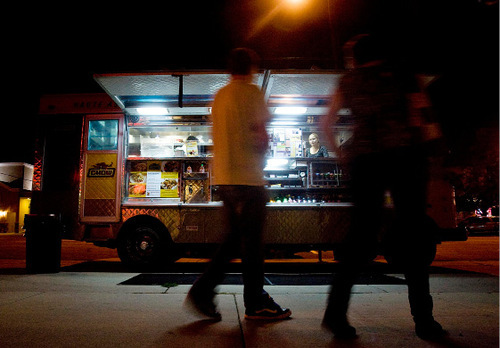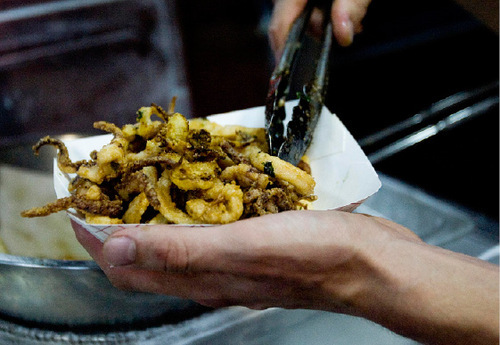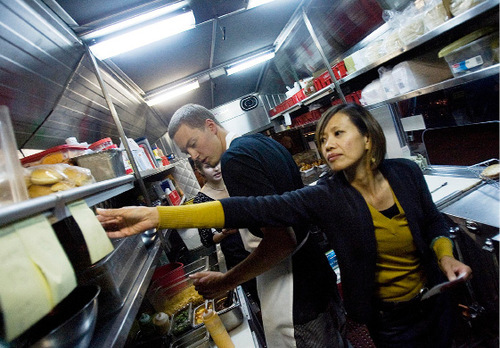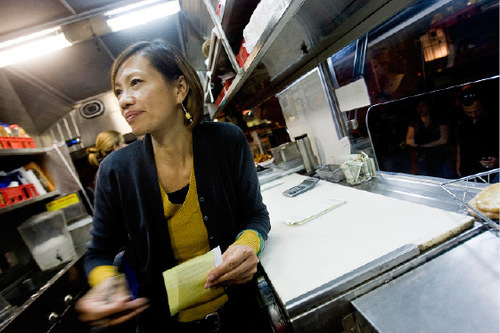This is an archived article that was published on sltrib.com in 2010, and information in the article may be outdated. It is provided only for personal research purposes and may not be reprinted.
When SuAn Chow hits the road as self-proclaimed "boss lady" of the Chow Truck, she's not only a pioneer on Utah's dining scene, she's an outlaw in the Wild West of food culture.
Food trucks offering gourmet fare are one of the most exciting trends on American dining scene, with thousands of the vehicles roaming the streets of Los Angeles, Washington, D.C., San Francisco, San Diego, Seattle and Columbus, Ohio. Portland, in particular has seen explosive growth, with more than 500 trucks and trailers dishing out delights ranging from tacos al pastor to khao man gai. On Aug. 15, the Food Network even launched "The Great Food Truck Race" to exploit the trend.
But Chow's gleaming stainless steel-and-yellow rolling bistro is pretty much a solo act in Salt Lake City.
Since January, Chow has operated her food truck, offering such culinary delights as tacos and sliders filled with coconut-lemon grass chicken, pineapple-ginger pork and flash-fried calamari. Her business has been made more challenging due to archaic city regulations written for the lowly lunch trucks that serve construction workers. Like them, Chow is prohibited from parking in one location for more than two hours at a time, nor can she pull up to the curb — even if she plugs the meters.
Because of those restrictions, she is forced to constantly hunt for parking lots, find out who owns them, then negotiate with the owners to park. Even with permission, city rules force her to move after two hours.
"It's a seven-day job," she says of the administrative hassles of operating a food truck. And Chow knows the headaches of the food business. In the 1980s, she owned and operated the Salt Lake City restaurant Charlie Chow's.
But through tenacity, salesmanship and sympathetic bureaucrats, Chow has gotten the city to grind forward toward ordinance changes that would allow her — and the future food trucks she's hoping will come — to roll more freely about the city.
Mike Akerlow, the city's small business economic development manager, was taken with Chow's creative small-business model. Beyond the idea of haute cuisine on wheels, Chow uses social media — including Facebook and Twitter — to let her customers know where they can get their next fix.
"We saw this as a growing trend in the country," Akerlow says. "It's a great business model."
He says the city has gotten calls from entrepreneurs interested in expanding the food truck-concept to mobile bike shops and a bookmobile-coffee shop.
A small business advisory group that includes two restaurant owners has approved some Chow-driven changes, including extending the two-hour limit to four hours, and allowing additional workers aboard the trucks, Akerlow says. A public open house on the changes is scheduled for later this month and the Planning Commission will study the suggested modifications in November. The suggested changes could be heard by the City Council in December.
Chow, who has been operating in the ordinance's gray areas, is hoping the changes will be in place by the new year, ending her outlaw days.
But the effort to make Utah's capital city food truck-friendly is facing resistance from restaurant owners. Some see Chow as a the equivalent of an urban pirate — anchoring near them to commandeer their customers. It's unfair, they say, because food trucks don't have to meet the capital costs of a brick-and-mortar eatery or even the same fees and taxes. None of the critics would be quoted for this article.
The city's advisory board is aware of such concerns, and hopes to address them as it continues updating the city's regulations.
That kind of backlash against the trucks has begun in other cities.
Bill Perry, of the Oregon Restaurant and Lodging Association, says brick-and-mortar restaurants that are struggling in the bad economy think the trucks have an unfair economic advantage. In Portland, many food trucks have become semi-permanent occupants of private parking lots, putting out tables and awnings to compete directly with restaurants.
"I don't like the fact that they are being treated differently than stand-alone restaurants," Perry says. "If they are held to a lower standard, they can produce food much cheaper. We're fine with them as long as everyone is on a level playing field."
The Salt Lake Chamber of Commerce hasn't officially taken a position on the trucks, but Jason Mathis, executive director of the Downtown Alliance, is a big supporter.
"The pros far outweigh the cons," Mathis says. "Chow Truck adds a cosmopolitan flair to downtown Salt Lake City."
Chow has heard from some restaurant owners who don't appreciate her concept. "Instead, of trying to stop me, they should be looking to what they can do to make their restaurants more interesting," she said.
She would love to see Salt Lake City's best restaurants going mobile. "I'd like to see the restaurants involved because it would bring high quality to the trucks," she says.
Only a few other trucks have been sighted around town, including Osvaldo Aguilera's "Chuvi Duvi" truck parked off Main Street just south of the City Creek construction site, which sells tortas cubanas. So far, the mobile restaurant hasn't used online marketing or developed a social media presence.
Meanwhile, Chow has been taking the food trend out of downtown and into Salt Lake County. "I've gotten lots of requests to come farther south. That's what is great about the mobile concept — I can reach out to people."
J.T. Norton at Ebay asked Chow to bring the truck onto the Draper campus as part of a charity drive.
"We have an extreme lack of food options here in Draper," he says. "They fell in love with the Chow Truck."
Food trucks on the web
Track the Chow Truck at @Chowtruck on Twitter or http://www.chowtruck.com.
Find out more about "The Great Food Truck Race" at http://www.foodnetwork.com/the-great-food-truck-race/index.html









